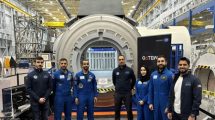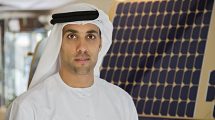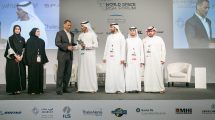 Salem Al Marri, Assistant Director General for Scientific and Technical Affairs at Mohammed bin Rashid Space Centre was elected as an IAA corresponding member in a ceremony held on the side-lines of International Astronautical Congress (IAC), Guadalajara, Mexico. Al Marri was elected for his outstanding contributions to the science, technology and space sectors in the UAE and his efforts in promoting international cooperation in the advancement of the space sector worldwide. As a corresponding member, Al Marri will contribute to the international endeavours and the cooperation between all countries and organisations for the advancement of space technology and sciences around the world.
Salem Al Marri, Assistant Director General for Scientific and Technical Affairs at Mohammed bin Rashid Space Centre was elected as an IAA corresponding member in a ceremony held on the side-lines of International Astronautical Congress (IAC), Guadalajara, Mexico. Al Marri was elected for his outstanding contributions to the science, technology and space sectors in the UAE and his efforts in promoting international cooperation in the advancement of the space sector worldwide. As a corresponding member, Al Marri will contribute to the international endeavours and the cooperation between all countries and organisations for the advancement of space technology and sciences around the world.
Al Marri expressed his pride and happiness to be the first Emirati elected to such a prestigious organisation as IAA and to represent MBRSC and the UAE space sector, saying: “The space sector in the UAE has reached a good position in the global space community in such a short time. This drives us to play a positive role in global space affairs and participate in the international endeavours of developing peaceful applications of space technology and sciences.”
Al Marri currently holds the position of Assistant Director General for Scientific and Technical Affairs at MBRSC, and he was the Project Manager for the satellite projects DubaiSat-1 and DubaiSat-2, the first two UAE satellites launched into space in 2009 and 2013, respectively. He also represents MBRSC in international and local conferences and plays a significant role in areas of cooperation between MBRSC and a number of external bodies involved in the space sector.
The International Academy of Astronautics (IAA) is an independent non-governmental organisation that was founded in 1960 and recognised by the UN in 1966. IAA consists of more than 1,200 members in 75 countries, including some GCC countries and other Arab countries such as: the UAE, Saudi Arabia, Kuwait, Bahrain, Egypt, Morocco, Tunisia and Syria.
IAA aims to foster the development of astronautics for peaceful purposes; it also recognises individuals who have distinguished themselves in space science or technology. It provides a programme through which members may contribute to international endeavours, and promotes international cooperation in the advancement of space science. The activities of IAA include encouraging international scientific cooperation through forums and seminars in the area of space science, space technology and system development, space systems operations and utilisation, space policy, law and economy, space and society, culture and education, among others.












Add Comment